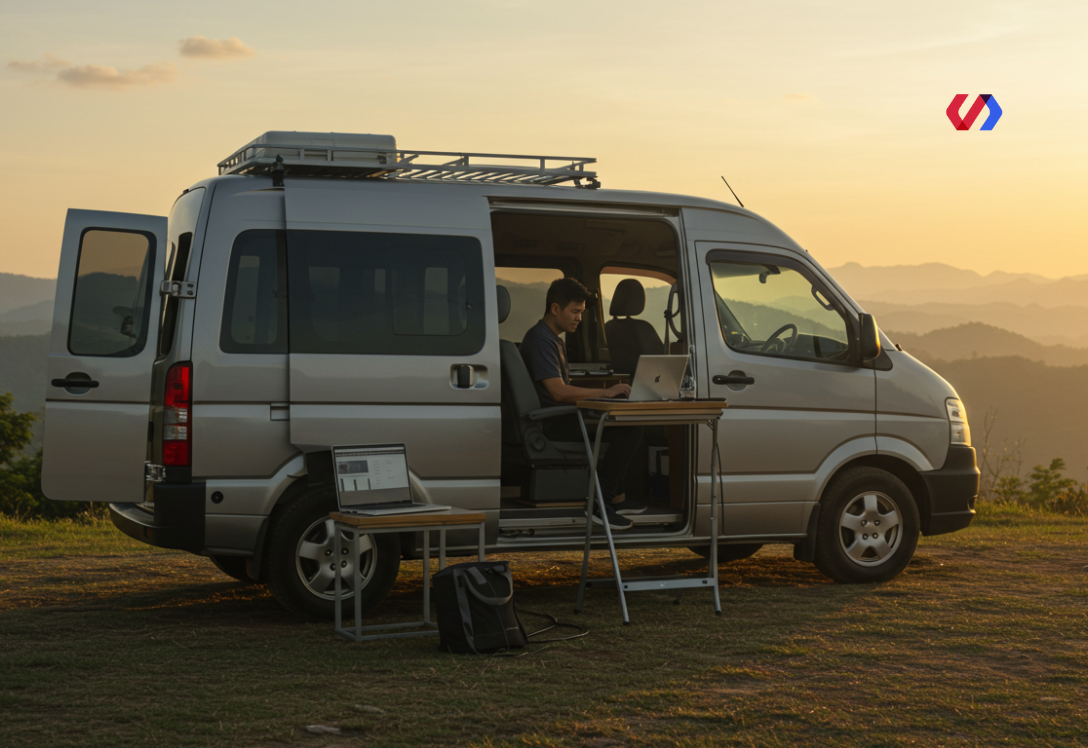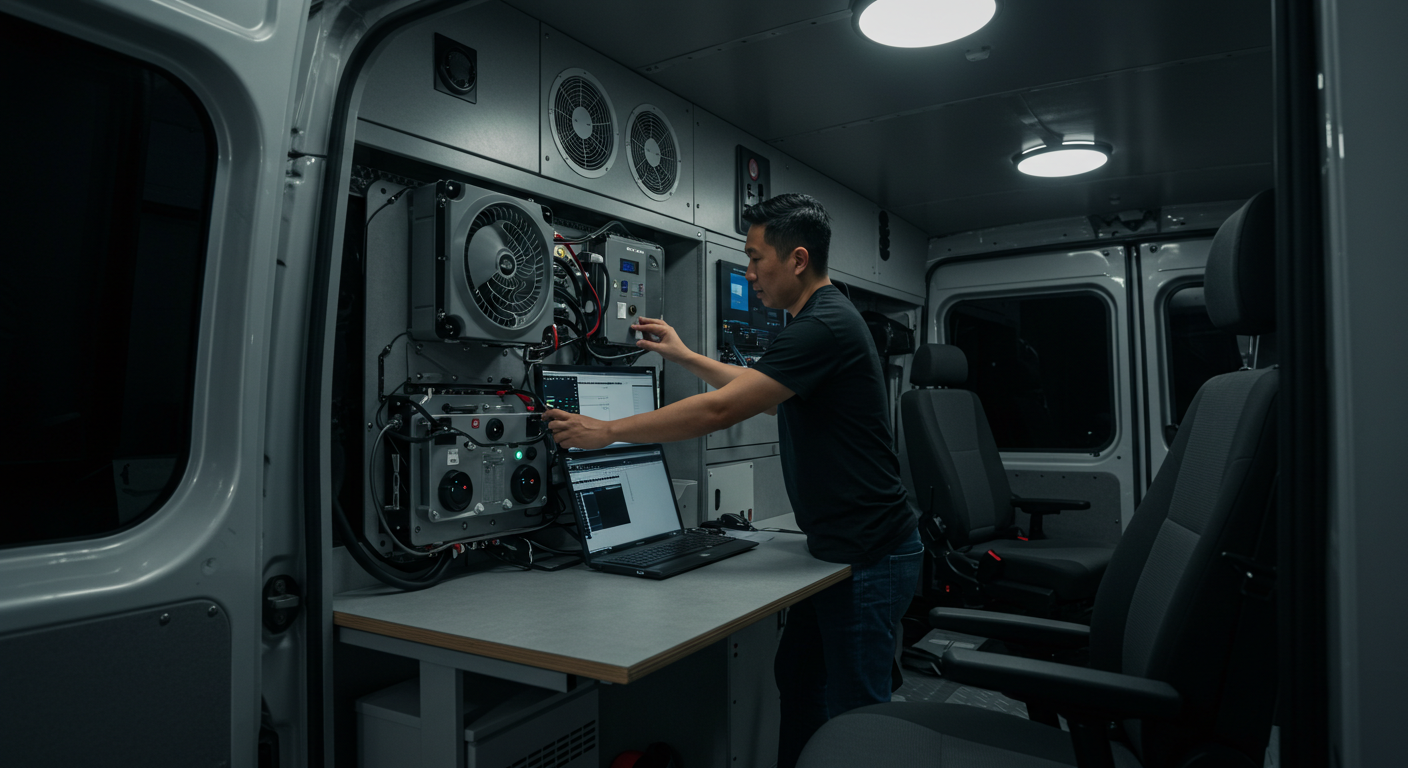Marcus thought converting his van into a mobile office would be simple. Buy a desk, install some shelves, add a power inverter, and he’d be ready to run his IT support business from anywhere in Brunei. However, unlike an office, his van workspace presented unique challenges that he hadn’t anticipated.
Three months later, he was sitting in a Tutong parking lot with a dead laptop battery, melted chocolate bars scattered across his “desk,” and a client on the phone asking why their server migration was delayed again.
As a remote worker living van life, Marcus hoped to get work done from anywhere, but reality quickly set in. “I had no idea my laptop would overheat so badly in a closed van,” Marcus explains. “Or that power inverters make this horrible buzzing sound during video calls. Or that my ‘ergonomic’ setup would leave me with back pain after two hours.”
But Marcus didn’t give up. He spent the next six months learning what actually works for vehicle-based businesses – not the Instagram-perfect van life setups, but real solutions for people who need to earn money from a moving office.
Today, his mobile IT business generates BND 12,000 monthly while serving clients from Bandar to Temburong. But more importantly, he’s comfortable, professional, and productive in a setup that actually works for serious business operations.
If you’re considering running your business from a vehicle, if you want to know what is a mobile office or van workspace, it is a dedicated area in your vehicle—such as a van, truck, or car—designed for your work needs. Setting up an efficient workspace in your van is crucial for your productivity and comfort. Think about the essentials you need in your van workspace, such as power, internet, and ergonomic seating, to get the most out of your mobile office.
Here’s what Marcus wishes someone had told him before he wasted months and money on solutions that look good but don’t work, so you can learn how to avoid common mistakes from the lessons he learned along the way.
Key Takeaways
- Power management is more complex than you think – Simple inverters and car batteries won’t support serious business operations. You need dedicated power systems designed for sustained computer use.
- Climate control determines productivity – Working in Brunei’s heat without proper ventilation and cooling solutions will limit your productive hours to early morning and evening.
- Vehicle ergonomics prevent injury – Standard car seats and improvised desks cause serious health problems during extended work sessions. Proper ergonomic setup is essential for sustainability.
- Internet connectivity has hidden challenges – Mobile data works differently when you’re constantly moving, and signal strength varies dramatically across Brunei’s geography.
- Legal and insurance considerations matter – Operating a business from a modified vehicle has regulatory requirements that can cause serious problems if ignored.
- Security systems protect expensive equipment – Mobile offices are targets for theft, and standard vehicle security isn’t adequate for business equipment protection.
- Noise management affects professionalism – Vehicle-based businesses face unique audio challenges during client calls that office workers never consider.
- Maintenance costs increase significantly – Business use accelerates vehicle wear and tear in ways that affect both transportation and equipment reliability.
- And more – There are additional considerations and benefits to running a mobile office that go beyond this summary.
Understanding Vehicle-Based Business Realities
The Power Problem No One Talks About
Most people think adding a power inverter to their car will solve electricity needs, but inverters create heat, noise, and electrical interference that makes professional work difficult or impossible.
Car alternators aren’t designed to support sustained computer use while parked. Running your engine for hours to power equipment wastes fuel, creates noise, and draws unwanted attention in residential or business areas.
Professional vehicle-based businesses need dedicated power systems – auxiliary batteries, solar panels, or shore power connections – that provide clean, quiet electricity for extended work sessions. To make power more reliable and efficient, these setups are designed to minimize interference and maximize uptime.
The real challenge isn’t just having power, but having reliable power that doesn’t interfere with sensitive electronics or create noise during important client calls.
Climate Control Beyond Air Conditioning
Brunei’s tropical climate makes vehicle-based work challenging for 8-10 hours daily when temperatures and humidity are too high for productive computer work in enclosed spaces.
Standard vehicle air conditioning systems aren’t designed to cool parked vehicles efficiently and drain batteries quickly when the engine isn’t running.
Professional mobile offices need auxiliary ventilation, insulation, and cooling solutions that work independently of the vehicle’s engine while maintaining comfortable working conditions throughout the day.
Climate control is the key to productivity and comfort in mobile workspaces. The key is creating climate-controlled environments that enable full-day productivity rather than limiting work to cooler morning and evening hours.
Ergonomic Challenges That Cause Real Injury
Vehicle seats and improvised work surfaces create ergonomic problems that lead to serious back, neck, and wrist injuries when used for extended computer work.
Standard vehicle interiors aren’t designed for sustained desk work, and makeshift solutions often position screens, keyboards, and seating at angles that cause repetitive strain injuries.
Professional vehicle offices require proper ergonomic furniture designed for mobile environments – adjustable desks, supportive seating, and equipment positioning that prevents injury during long work sessions.
The goal isn’t just comfort, but preventing the cumulative physical damage that can end careers when ignored.
Essential Vehicle Office Infrastructure
Professional Power Systems
Dedicated auxiliary battery systems provide clean, quiet power for extended computer use without running the vehicle engine or creating electrical interference with sensitive equipment.
Solar panel installations can supplement battery systems in sunny climates, reducing dependence on external charging while extending off-grid working capability significantly.
Shore power connections allow you to plug into standard electrical outlets when available, providing unlimited power for intensive work while preserving battery capacity for remote locations.
Battery monitoring systems prevent power depletion that could leave you stranded while ensuring you have adequate capacity for planned work sessions.
Climate Control Solutions
Auxiliary ventilation fans create airflow that makes tropical working conditions tolerable even when traditional air conditioning isn’t practical or efficient.
Window tinting and insulation reduce heat buildup that makes vehicle interiors uncomfortable during peak daylight hours in Brunei’s climate.
Portable air conditioning units designed for mobile applications can provide comfort during intensive work sessions without completely draining power systems.
Strategic parking and workspace orientation can minimize sun exposure and maximize natural ventilation to reduce climate control energy requirements.
Communication Infrastructure
External antenna systems improve mobile internet reliability and signal strength compared to standard smartphone connectivity, especially in rural or challenging terrain.
Signal boosters amplify weak cellular signals that are common in some areas of Brunei, improving both internet connectivity and call quality for professional communications.
Multiple carrier redundancy ensures connectivity when one network has coverage gaps or technical problems in specific locations.
Noise reduction solutions minimize road noise, engine sounds, and environmental audio that can disrupt professional phone calls and video conferences.
Security and Equipment Protection
Vehicle alarm systems designed for mobile offices protect expensive computer equipment and business tools that represent significant investment and business continuity risks. These systems help keep them safe from theft and unauthorized access.
Equipment mounting systems secure laptops, monitors, and tools during travel while preventing theft and damage from vehicle movement or sudden stops.
Privacy window films prevent visual access to equipment while maintaining professional appearance and reducing security risks in various parking locations.
Backup and recovery systems protect business data and ensure continuity when equipment is damaged, stolen, or experiences technical failures.
Real-World Success: How Marcus Built His Mobile IT Empire
The Expensive Learning Phase
Marcus initially bought standard van conversion components from online retailers without understanding the specific requirements of business operations versus recreational camping.
“I spent BND 8,000 on equipment that looked professional but didn’t work for actual business use,” Marcus explains. “The desk was too small, the power system couldn’t handle my equipment, and I was constantly uncomfortable.”
His first major client project nearly failed when equipment overheated during a critical server migration because his ventilation system wasn’t adequate for sustained computer operation.
That failure forced Marcus to research professional mobile office solutions rather than trying to adapt recreational equipment for business use.
The Professional Rebuild
Marcus invested in a proper auxiliary battery system with solar charging that could power his equipment for full workdays without engine noise or electrical interference.
He installed commercial-grade ventilation and auxiliary air conditioning that maintained comfortable working temperatures throughout Brunei’s hottest periods.
Professional ergonomic furniture designed for mobile offices eliminated the back and neck pain that had been limiting his productive working hours.
Upgraded communication systems with external antennas and signal boosters ensured reliable internet connectivity and clear client calls from remote locations.
The Business Results
Within six months of the professional rebuild, Marcus’s mobile IT business was generating BND 12,000 monthly in sales while serving clients across all districts of Brunei.
The improved setup enabled him to work full days comfortably, take on complex projects requiring sustained concentration, and maintain professional standards during client interactions.
“Now I can work an eight-hour day in my van more comfortably than I used to work in traditional offices,” Marcus says. “The setup is designed for productivity, not just looking cool on social media.”
Most importantly, the professional mobile office setup enabled Marcus to charge premium rates for on-site IT services while eliminating office overhead completely.
Building Your Vehicle Office System
Power System Planning
Calculate your actual power requirements based on equipment specifications and planned usage patterns rather than guessing or using recreational camping guidelines.
Professional power systems require larger battery capacity, appropriate charging systems, and clean power delivery that supports sensitive computer equipment reliably.
Consider total cost of ownership including maintenance, replacement schedules, and upgrade capability when selecting power system components.
Space Optimization Strategies
Measure and plan your workspace layout carefully to ensure ergonomic positioning while maximizing storage and equipment accessibility.
Consider workflow patterns and equipment interaction to design efficient workspace layouts that support productivity rather than just fitting everything inside.
Plan for equipment ventilation, cable management, and maintenance access that will be needed during regular business operations.
Vehicle Selection Considerations
Choose vehicles based on interior dimensions, weight capacity, and modification potential rather than just appearance or initial purchase price.
Consider maintenance costs, fuel efficiency, and reliability for business use rather than recreational criteria when evaluating vehicle options.
Evaluate legal requirements for commercial vehicle registration, insurance, and operation that may affect vehicle choice and ongoing costs.
Legal and Regulatory Considerations
Research Requirements Before Starting
Operating a business from a modified vehicle may have specific requirements depending on your business type, vehicle modifications, and the nature of your commercial activities in Brunei.
Contact relevant authorities including JPD (Road Transport Department) and business licensing departments to understand requirements specific to your situation.
Consider any parking restrictions or local guidelines about where commercial activities can be conducted when planning your mobile office operations.
Insurance and Liability Considerations
Check with your insurance provider about coverage for business equipment in vehicles and whether commercial activities affect your current policy terms.
Vehicle modifications, especially electrical and structural changes, may need to be declared to insurance companies to maintain coverage validity.
Consider whether you need additional coverage for business equipment, liability for client work, or protection specific to mobile business operations.
Safety and Compliance Planning
Electrical modifications should be performed by qualified professionals to ensure safety and maintain insurance coverage.
Significant vehicle modifications may require professional evaluation to ensure they don’t affect vehicle safety or roadworthiness.
Plan for emergency procedures and safety equipment appropriate for mobile office operations in various locations across Brunei.
Important: Always consult with relevant authorities and professionals before making significant vehicle modifications or starting commercial operations from vehicles. Requirements may change over time, so verify current regulations.
Common Vehicle Office Mistakes That Cost Money
Underestimating Power Requirements
Most people drastically underestimate the power needed for sustained computer work and choose inadequate systems that limit productivity or require constant external charging.
Cheap power inverters create electrical noise that interferes with audio equipment and can damage sensitive electronics over time.
Ignoring Climate Control Needs
Attempting to work in hot, humid vehicle interiors without proper climate control limits productive hours and affects equipment performance and longevity.
Inadequate ventilation creates condensation problems that can damage electronics and create uncomfortable working conditions.
Choosing Style Over Function
Many vehicle office conversions prioritize appearance over ergonomics and functionality, creating setups that look impressive but aren’t sustainable for daily business use.
Recreational equipment often isn’t designed for the intensity and duration of professional business operations.
Neglecting Security Planning
Expensive business equipment in vehicles requires security measures beyond standard vehicle protection to prevent theft and business disruption.
Visible equipment attracts attention and increases security risks that require careful planning and appropriate protection measures.
Getting Started: Your Vehicle Office Development Plan
Phase 1: Requirements Analysis
Document your actual business needs, power requirements, space needs, and budget constraints before making any vehicle or equipment purchases.
Research legal requirements and insurance considerations that may affect vehicle choice and modification approaches.
Phase 2: Vehicle Selection and Planning
Choose and acquire appropriate vehicle based on business requirements rather than personal preferences or recreational criteria.
Develop detailed modification plans that prioritize functionality, safety, and legal compliance over appearance.
Phase 3: Professional Installation
Work with qualified installers for electrical, climate control, and safety-critical modifications rather than attempting DIY installation of complex systems.
Test all systems thoroughly under actual working conditions before committing to full business operations.
Phase 4: Optimization and Refinement
Use the vehicle office for actual business operations and refine the setup based on real-world experience rather than theoretical requirements.
Document what works and what doesn’t to guide future improvements and help others avoid common mistakes.
FAQ
How much should I budget for a professional vehicle office conversion? Expect BND 15,000-30,000 for a professional conversion that supports full-time business operations. This includes power systems, climate control, ergonomic furniture, and communication equipment. Recreational conversions cost less but won’t support serious business use.
Do I need special licenses or permits to operate a business from a vehicle? This depends on your business type and location. Research commercial vehicle registration, business operation permits, and parking regulations in areas where you plan to work. Consult with relevant authorities before starting operations.
How do I handle client meetings in a vehicle-based office? Many vehicle offices include exterior awnings and seating for outdoor meetings. Alternatively, meet clients at their locations, use co-working spaces, or hotels when traditional meeting environments are required.
What about internet connectivity in remote areas? Use multiple carrier services, external antennas, and signal boosters to improve connectivity. Plan work that requires intensive internet access for areas with strong coverage, and offline-capable work for remote locations.
How do I maintain professional image with a vehicle office? Focus on service quality, reliability, and results rather than physical office appearance. Many clients appreciate the convenience and environmental benefits of mobile service delivery when executed professionally, which can contribute to the success of your business.
Ready to Build a Vehicle Office That Actually Works?
Marcus’s journey from failed DIY conversion to professional mobile office shows that success requires proper planning, appropriate equipment, and realistic understanding of business requirements versus recreational use.
The difference between a vehicle office that limits your business and one that enhances it comes down to professional-grade systems designed for sustained business operations rather than occasional recreational use.
Digital Sage helps vehicle-based businesses establish the digital marketing presence and technology infrastructure that supports professional mobile operations. We understand the unique challenges of marketing mobile businesses and building online credibility without traditional office presence.
Our expertise includes mobile-optimized websites, digital marketing strategies that work for location-independent businesses, and technology solutions that integrate seamlessly with vehicle-based operations.
We help mobile businesses establish strong online presence, implement cloud-based systems, and create digital marketing campaigns that attract clients who value convenience and professional mobile service delivery.
Ready to build the digital foundation that supports successful vehicle-based business operations? Let’s discuss how our marketing and technology solutions can help you establish credibility and attract premium clients while operating from your mobile office.
Contact Digital Sage today to discover how the right digital marketing strategy and technology infrastructure can transform your vehicle office into a profitable, professional business operation.




